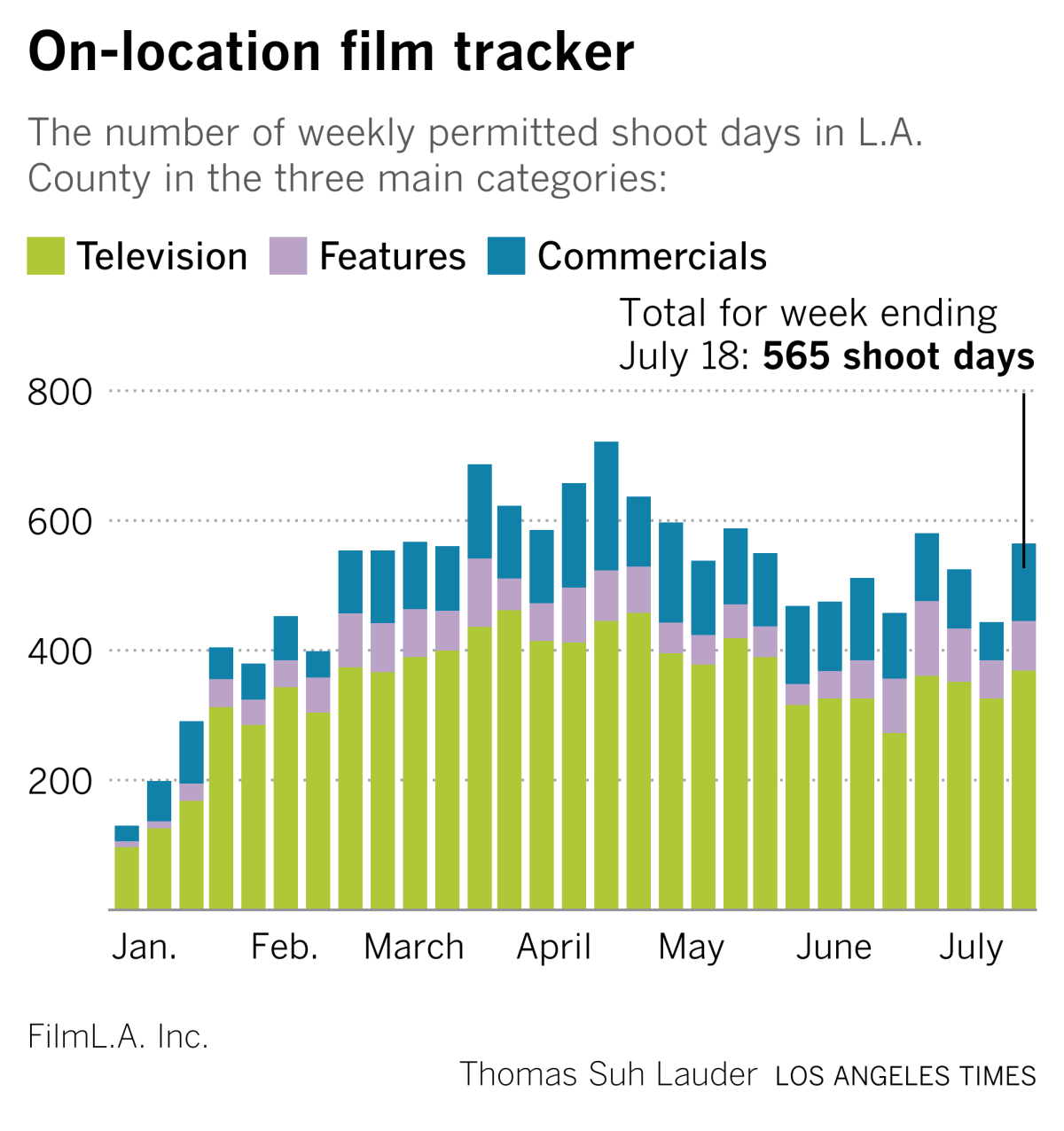Wide Shot: Does the Golden Globes group want to change?

- Share via
It’s hard to change an organization when a substantial portion of its membership doesn’t really want to change or doesn’t see a fundamental need to do so.
Inside the business of entertainment
The Wide Shot brings you news, analysis and insights on everything from streaming wars to production — and what it all means for the future.
You may occasionally receive promotional content from the Los Angeles Times.
The Hollywood Foreign Press Assn., the 85-member collective that votes on the Golden Globes, has said it wants to transform itself and has promised to do so after renewed focus on its alleged self-dealing and ethical lapses.
But it’s clear from the reporting of my colleague Stacy Perman that the sentiment is much less widely held within the organization than its leaders would want viewers, celebrities, and the once Globes-friendly studios and TV networks to believe.
Perman last week detailed a heated video meeting between HFPA members and a contingent of publicists that is withholding access to celebrity clients until the Golden Globes group gets its house in order.
One HFPA member on the call pushed back on demands for greater diversity by saying in one breath, “We want to change,” but in others uttering phrases like, “We’ve got Muslims and Jews and Catholics, etc.” and “Let’s not be overly woke.” Not a great sign.
Critics of the organization tweeted about the meeting with sometimes amused bewilderment, highlighting specific examples of internal chaos.
The Black List founder Franklin Leonard tweeted about Perman’s piece with a thread of reactions, starting with this: “Three paragraphs into this article and we’ve already got a member of the HFPA emotionally quoting (and likely misusing) [writer Baratunde Thurston] about the healing power of love during a Zoom meeting with publicists. Lord, grant me strength as I continue.”
Ava DuVernay compared the meeting to a prestige TV series. “Mare of Easttown? Lovecraft Country? Queen’s Gambit? If you thought those shows brought drama, this roller coaster of an article about the HFPA’s internal chaos, infighting and general cluelessness takes the cake,” she wrote. “Spiraling out of control to keep control.”
Adding “Succession” to DuVernay’s list may be too on the nose.
This all comes as the group is supposed to be voting on a new slate of bylaws that promises “transformational change.” The vote follows months of infighting and external pressure stemming from the Los Angeles Times’ investigation that brought to light allegations of financial and ethical lapses and pointed out that not one of the HFPA’s then-87 members was Black.
Internal tensions have increasingly spilled into the public sphere, as with the blaze-of-glory exit of two members last month who described the nonprofit’s attempts at reform as “window dressing.”
A longtime member, Yenny Nun, has written to lawyers at Ropes & Gray and others, saying that certain bylaw changes withdrawing the rights of “elderly” members “will be considered Discrimination, Racism and Xenophobia” and open the group up to “a Class Action Suit.”
She’s tweeted much of the same and told The Times that “The Twitters speak for themselves,” a line that Thurston suggested should be put on “all the merch.” I too want “The Golden Globes: The Twitters speak for themselves” coffee mug.

The internal strife and resistance among some members explains why a prominent outsider is coming in with his own proposal.
Todd Boehly, who chairs the parent company of longtime Golden Globes producer Dick Clark Productions, is trying to get the HFPA back into Hollywood’s good graces with an elaborate reform plan that would, through a spin-off, create a for-profit Golden Globes company “in partnership” with Boehly’s holding company, Eldridge Industries.
This is baldly an attempt by Eldridge to protect other investments in its portfolio, such as Dick Clark Productions, which relies on the revenue the Globes generate. Such an arrangement would also give Eldridge a more direct business relationship with the awards body than it currently has and allow it to potentially expand the Globes’ business.
Eldridge’s holdings also include film and TV studio MRC and trade publication the Hollywood Reporter, which, like all who cover awards season (including The Times), benefits from a healthy industry of red carpet events, star-studded photo shoots and for-your-consideration ads.
It’s not at all clear that the plan will be accepted by the HFPA’s membership, nor is it obvious how exactly it will work if it is implemented.
Will the Globes members, particularly the longtime participants who have enjoyed the perks and access of the organization for decades, be willing to cede any control and influence to an outside investor? Another question is whether the industry — meaning stars, studios and publicists — will embrace a separate Globes body rejiggered in the way Boehly has proposed.
Under the Eldridge plan, the new entity would be governed by a 15-member board. It would implement new criteria and requirements for membership into the HFPA. Additionally, the HFPA would add 50 journalist voters, with a focus on diversity.
If the proposed deal revives and expands the Globes, it could preserve and increase the value of the enterprise itself, along with Dick Clark Productions.
But it may not be a long-term solution. Eldridge is a private investment company and would eventually seek an exit to generate a return. Eldridge already tried to sell Dick Clark Productions to China’s Dalian Wanda Group for $1 billion a few years ago when inflated China-Hollywood deals were all the rage. That proposed sale collapsed in 2017. Dick Clark Productions is now part of the “live and alternative” division of MRC.
It was never going to be easy to overhaul the HFPA. Its ethical quirks were less of an open secret than a running gag for the likes of Ricky Gervais and Tina Fey. HFPA has to decide whether it will change from within or with outside help. If it does neither, it risks collapse.
Stuff we wrote

— If you’re on the fence about seeing “F9: The Fast Saga” in a theater, would a personalized video from John Cena help? Wendy Lee on how digital companies like Cameo are working with studios to bring people back to the movies.
Check out our coverage of Los Angeles’ movie theater business, including the state of arthouses (hey, Tarantino!), theater employees and the fans who are finally coming back.
— Fox News fans love “The Five,” but can political talk shows make room for dissent? Stephen Battaglio on how the popular show plans to proceed in a polarized media environment after the departure of its lone liberal voice, Juan Williams. It’s not alone in having to deal with a one-sidedness problem.
— South Korea aims to have a bigger footprint in Hollywood. This deal could be a major step, reports Lee.
— The latest in our Explaining Hollywood series: How to get yourself the right agent.
— Other things that happened: AMC Networks settled a long-running ‘Walking Dead’ dispute for $200 million. That’s a lot of zombie prosthetics. ... Disney’s changing of the guard continued as longtime communications chief Zenia Mucha, once described as “director of revenge,” announced her impending departure.
‘Widow’ window win? (d’oh!)

Last week, “Black Widow’s” same-day release in theaters and on Disney+ Premier Access looked like a success with $80 million in domestic ticket sales, $78 million internationally and $60 million online. Maybe it was, but the Marvel film dropped 67% in its second weekend at the domestic box office, prompting the National Assn. of Theatre Owners to pounce on the strategy.
I wrote about the debate here. NATO, which has held its tongue on Disney’s strategy until now, said releasing “Black Widow” simultaneously in theaters and at home clearly cannibalized box office and spurred piracy. That’s almost certainly true, but by how much is debatable.
Cowen & Co.’s Doug Creutz released a deep dive into that question Monday, concluding that Disney’s decision to trade some box office revenues for digital sales was probably worth it in the short term.
NATO’s analysis of Disney’s business model should obviously be taken with a grain of salt. However, Creutz also points out that Disney and other studios should think about how same-day releases affect not just the profits of individual films but the overall economics of movies in the long run.
Number of the week

Is A24, the New York upstart behind “Uncut Gems” and “Moonlight,” worth $3 billion? It’s one of a string of astronomical valuations that have been floated in recent days for production companies, including Reese Witherspoon’s Hello Sunshine ($1 billion) and Maverick Carter and LeBron James’ SpringHill ($750 million).
By now, just about every commentator had made the point that these numbers are, to put it mildly, probably hard to justify on the economics.
But dealmakers have spotted an opportunity after MGM sold to Amazon for $8.45 billion, pending government approval. Big companies want to bulk up on content, and some prospective buyers (ahem, Apple) have gigantic war chests. That’s resulted in what a friend of the Shot privately called “imaginary numbers.” Whether those numbers become real depends on the buyers’ appetites.
Hollywood production
The latest from Anousha Sakoui on the state of production incentives to keep shoots in California: Hollywood is in line for a $330-million tax credit boost for TV shows and new studios. Senate Bill 144, which is meant to tackle a shortage of soundstage space, also introduces diversity goals to address the lack of access to Hollywood for workers of color and other marginalized groups. Here’s the latest chart on L.A.’s on-location production recovery.

More stories from the week
— Kevin Roose goes inside Facebook’s data wars. Executives at the social network have clashed over CrowdTangle, a Facebook-owned data tool that revealed users’ high engagement levels with right-wing media sources. (NYT)
— People are talking about that New Yorker short story “Cat Person” again. Except this time, the controversy is about the real life impact of the piece on the people from whose lives it borrowed. (Slate)
— The one Netflix story every office worker read last week: Netflix fires marketing execs for criticizing bosses over Slack. (THR)
— Speaking of Netflix, the streamer now wants to do video games. The company also reports earnings Tuesday, when we’ll see whether the slowdown in subscriber growth continues. (Bloomberg)
— WaPo analysis: Fox News’ Peter Doocy made a weird blunder in the White House briefing room over COVID-19 and the spread of anti-vaccine misinformation on Facebook (WaPo). Here’s Battaglio’s profile of Doocy from March.
Parting shot...
On the Spotify podcast “Bandsplain,” host Yasi Salek talks with experts to explain “cult bands and iconic artists,” including Steely Dan, My Chemical Romance and Fugazi, and what draws their rabid fans to them.
Because it’s on Spotify, the podcast features full tracks spanning the bands’ careers, giving “Bandsplain” the feel of an “essentials” playlist and master class simultaneously. For a good intro, listen to The Times’ Suzy Exposito rock out to Deftones.
Inside the business of entertainment
The Wide Shot brings you news, analysis and insights on everything from streaming wars to production — and what it all means for the future.
You may occasionally receive promotional content from the Los Angeles Times.




